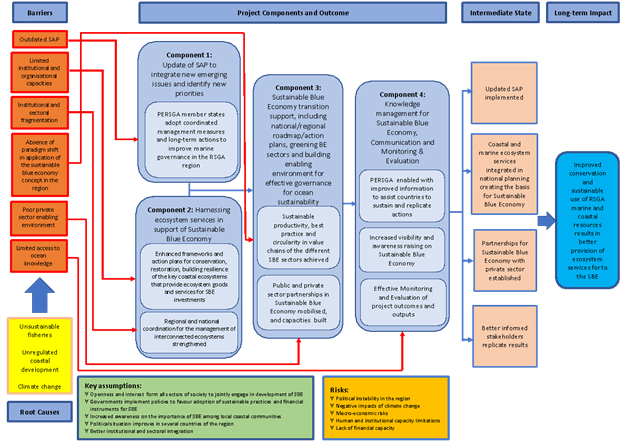A sustainable and inclusive Blue Economy should ensure that respective investments deliver long-term social and economic benefits, while protecting and restoring the biodiversity, productivity and resilience of marine ecosystems. It should be based on participatory and effective governance that is inclusive, accountable and transparent and promotes sustainable use in marine areas through far-sighted, anticipatory and preventive spatial planning and implementation of an ecosystem-based approach. Furthermore, it should be based on clean technologies, renewable energy and circular material flows and promote innovation and research in all Blue Economy sectors to achieve zero discharge, enabling at the same time the creation of employment opportunities for blue jobs in the marine and maritime sectors.
Fostering inclusive approach for transforming into Sustainable Blue Economy (SBE), the project interventions will support joined regional efforts to achieve effective environmental governance in blue economy sectors, such as strengthening capacities and regional coordination for environmental governance in different sectors, building circularity, best practices, sustainability principles etc. in the region. Recognizing the rich potential blue economy opportunities in the Red Sea and Gulf of Aden, countries of the region are projecting SBE growth as a strategic option to support economic development in their national visions. Among PERSGA countries, several are LDCs (including Djibouti, Somalia, Sudan and Yemen), which also pursue to undertake SBE in their essential endeavours to tackle poverty and improve livelihood options. Other goals shared by all national visions in the region are to establish tangible SBE investments as part of their plans to support economic diversification and reforms, along with achieving marine environmental conservation and governance objectives.
Based on PERSGA platform, the project will build on the existing SAP taking into consideration: (i) need to update the TDA that will be leading to the updated SAP, endorsed and adopted by the countries of the region, and with the new emerging issues such as circularity, SDGs, climate change and SBE concepts, (ii) update the SAP priorities to include hotspot priorities also in the NAPs in order to strengthen the blue natural capital in the RSGA region, and (iii) map out the capacity building needs for PERSGA to successfully fulfil its commitments to monitor the implementation of the updated SAP. The regional mechanisms can thus act to implement new important principles, such as building circularity in blue economy sectors, providing for tailored guidelines, governance reforms, implementing instruments, enhancing visibility, engaging regional partners, building capacity and developing models adapted to the regional scale and needs.
Involving a complex set of issues and conditions, however, the enabling transformational interventions will aim at overcoming several current barriers and challenges, such as those related to fitting strategies, policies, capacities and access to technology adapting to new developments, and satisfying the evolving needs for effective governance to address environmental concerns, which influence the productivity and sustainability of existing and envisioned blue economy investments that rely on, and also affect marine ecosystem services. Actions proposed under this project also consider the local political, cultural, and socio-economic situation and cultural context, and are tailored according to the specific needs of the RSGA region.

